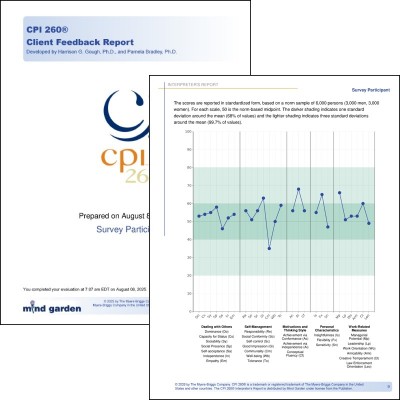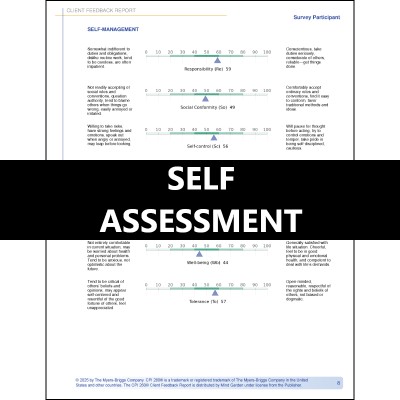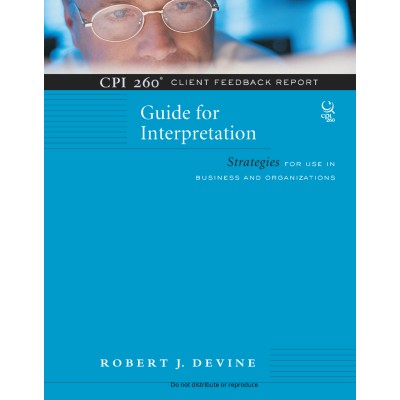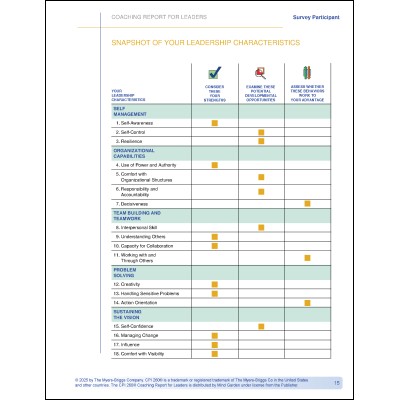 SEARCH
SEARCHProduct successfully added to your shopping cart
There are 0 items in your cart. There is 1 item in your cart.
California Psychological Inventory™
Author: Harrison G. Gough
The empirically-based California Psychological Inventory™ (CPI™) helps provide you with insight into your client and gives your client insight into how others see them.
That’s the power of the California Psychological Inventory™ (CPI™)—a trusted, research-based assessment that offers a deep understanding of an individual’s personality and behavioral tendencies by drawing on a comprehensive set of empirically-validated measures. Unique in its approach, it describes people based on how they’re likely to be perceived by others—without requiring a full 360-degree review—and how they typically behave in interpersonal, social, and leadership situations. These insights provide a clear picture of a person’s strengths and developmental opportunities.
Because of the insights the CPI provides, it is a powerful tool designed for counselors and coaches seeking to learn more deeply about their clients.
To participate in a CPI training workshop to help you understand how to unlock the many utilities and depth of client understanding, please contact The Myers Briggs Company for details.
The CPI 260 is available for personality research.
Copyright © 2002 by The Myers-Briggs Company. CPI 260 and the CPI 260 logo are trademarks or registered trademarks of The Myers-Briggs Company in the United States and other countries.
CPI 260® distributed by Mind Garden, Inc.
- Buy It
- Resources
- FAQ
- Interpreter’s Report plus Client Feedback Report Suite$52.95Builds two reports that interpret an individual's CPI 260 scores. You invite participants to take the survey and Transform™ generates their reports.In Stock
- Report About Me: Client Feedback Report (CFR)$52.95Interprets and reports on your CPI 260 scores. You complete the survey and Transform™ generates your report. Transform will connect this report to the "Send To" email provided at checkout. Note: This product is for a single use, with automated survey administration.In Stock
- CPI 260® Client Feedback Report Guide for Interpretation$44.00Provides information for administering the CPI 260® Client Feedback Report and interpreting the results. PDFs are not refundable.In Stock
- California Psychological Inventory™ for Researchers: CPI 260™ Manual and CPI™ Manual, Third Edition$50.00Read more about California Psychological Inventory™ for Researchers
Includes one manual each for the CPI 434 and the CPI 260. Special package pricing of $50. Includes details on CPI reliability and validity. PDFs are not refundable.In Stock - CPI 260® Coaching Report for Leaders Users Guide$44.00Provides information for using the CPI 260® Coaching Report for Leaders with clients and employees. PDFs are not refundable.In Stock
- Individual Report: Coaching Report for Leaders (CRL)$65.95Builds a report that interprets an individual's CPI 260 scores. You invite participants to take the survey and Transform™ generates their reports.In Stock
“Researchers and practitioners would be wise to consider utilizing this instrument to evaluate client career development and choice. Test scores from the CPI 260 can help clients navigate next steps of their career development in a variety of ways.” (p. 150)
“…researchers can expand upon previous studies by exploring further as to how administrators of the CPI 260 can use the results to predict outcomes and behaviors of students, employees, and supervisors, and for diverse populations. One potential avenue for exploration could be predicting academic success for various generations of students (e.g., Generation Z, adult learners) or for those of specialized populations (e.g., first generation students, honors students, those with disabilities). Fortunately, there are still many opportunities available to exploring the CPI 260 and its utility further.” (p. 150)
-- From Reysen, R. (2019). California Psychological Inventory. In K. B. Stoltz & S. R. Barclay (Eds.), A comprehensive guide to career assessment. Broken Arrow, OK: National Career Development Association.
Resources:
Boult, M. Precision Coaching and Development with the CPI 260® Assessment.
Comparing the CPI 260® instrument to the Benchmarks scales: An initial validity study. (2002).
How the CPI 260® assessment reveals 7 critical competencies for effective, productive leaders.
Morris, M.L., Thompson, R.C. & Shaubhut, N.A. (2007) CPI 260® Coaching Report for Leaders: Strengths and Developmental Opportunities.
Schaubhut, N. A., Thompson, R. C., & Morris, M. L. (2011). International technical brief for the CPI 260® assessment.
The CPI (California Psychological Inventory) was developed by Harrison G. Gough, PhD, a psychologist and professor at the University of California, Berkeley. Dr. Gough’s goal was to design an assessment that would capture the richness of everyday personality—how people understand themselves and others—rather than focusing only on clinical or pathological traits.
Since its introduction in 1956, the CPI has been refined and validated through decades of research, making it one of the most respected personality assessments in use today.
The CPI was developed through a careful combination of empirical research and practical observation by Harrison G. Gough, PhD. Beginning in the 1950s, Gough conducted extensive studies of how people describe themselves and how others describe them in everyday life. He gathered a wide range of data and behavioral observations from diverse groups to craft the CPI.
Using his research data, Gough focused on how participants’ responses related to descriptions of them provided by others. By comparing patterns of self-responses with structured observer ratings, he was able to identify the traits that consistently distinguished different personality profiles. This approach generated data that reflected how individuals are experienced by those around them, essentially providing a 360-degree view of personality without requiring multiple raters for each assessment.
The result is a scientifically validated assessment that measures personality in terms people recognize in daily life. Unlike many clinical inventories, the CPI focuses on how people function, interact, and succeed in real-world contexts.
The CPI measures personality using a series of carefully selected true/false items. Respondents indicate whether each statement accurately describes them. The CPI examines patterns of responses across all items, which are then interpreted in relation to validated scales.
These scales assess a wide range of traits, such as sociability, responsibility, self-control, and leadership potential. Because the instrument was constructed to reflect how people are experienced by others, the resulting scores provide insights into both self-perception and how an individual’s personality is likely expressed in varied contexts.
The CPI generates actionable information about strengths, potential blind spots, and behavioral tendencies, helping individuals, organizations and practitioners make informed decisions in personal development, coaching, and leadership contexts.
The CPI is a trusted personality assessment with a long history of use in diverse settings. Since its introduction in 1956, it has been refined and validated through decades of research and is cited in hundreds of published studies.
The CPI is a widely used personality assessment because it provides meaningful insights into how people think, feel, and behave in real-world situations. Unlike many assessments that focus narrowly on clinical traits, the CPI emphasizes everyday personality patterns that affect relationships, leadership, and personal effectiveness.
It is research-based, validated over decades, and designed to be practical for both individuals and organizations. Whether you’re looking to enhance leadership skills, improve team dynamics, or support personal development, the CPI offers a reliable roadmap for understanding strengths, potential challenges, and growth opportunities.
A new threat to the validity of personality instruments administered remotely and online is the use of Large Language Models (LLMs) by respondents to try to improve their success. This threat is particularly relevant when:
- 1. The assessment is being completed as part of a selection process or battery,
- 2. The administration is not proctored, and
- 3. The administration occurs online.
The use of LLMs and other forms of artificial intelligence is growing, and it is likely that some respondents will attempt to use these tools when completing selection instruments—and possibly even those designed for personal growth and development.
In response to this potential threat, an experimental validity indicator has been added to the CPI 260. Its purpose is to identify cases where AI may have been used to generate responses, with the goal of detecting likely AI usage while minimizing false positives.
Development of the CPI 260 AI Detector
The AI detector embedded in the CPI 260 was built empirically by having various AI models generate responses under specific instructions. These instructions directed the models to assume they were applying for a particular job at a given organizational level, and to answer in ways that would maximize their chances of being hired while avoiding detection by an AI detector.
Multiple AI providers were used, along with different iterations of their models, across various occupational categories and organizational levels. In total, data was generated for more than 1,000 AI “applicants.” Their response patterns were then compared to those of actual people who had completed the CPI 260.
Using the full set of 260 item responses, logistic regression was applied to create an indicator of AI usage. Item weights were generated to best separate AI-generated patterns from human patterns. The indicator was then tested with a separate holdout sample of unique AI cases (generated in a similar way), to evaluate its accuracy.
Results showed that the CPI AI indicator correctly detected 100% of AI-generated cases and had a false positive rate of just 0.4% for human respondents. In addition, the existing Fake Good measure in the CPI 260 was also triggered in about two-thirds of the AI-generated cases. This suggests that the Fake Good scale may also help flag potential AI use in selection contexts.
The AI indicator is included in all Mind Garden CPI 260 reports. However, it remains subject to ongoing evaluation and updates as LLM technology continues to evolve. Users concerned about AI-assisted responding are encouraged not to rely solely on the AI indicator, but to also implement other safeguards such as in-person or proctored administration, video recording, and/or monitoring completion times.

 LOGIN
LOGIN  BLOG
BLOG
 CART
CART




